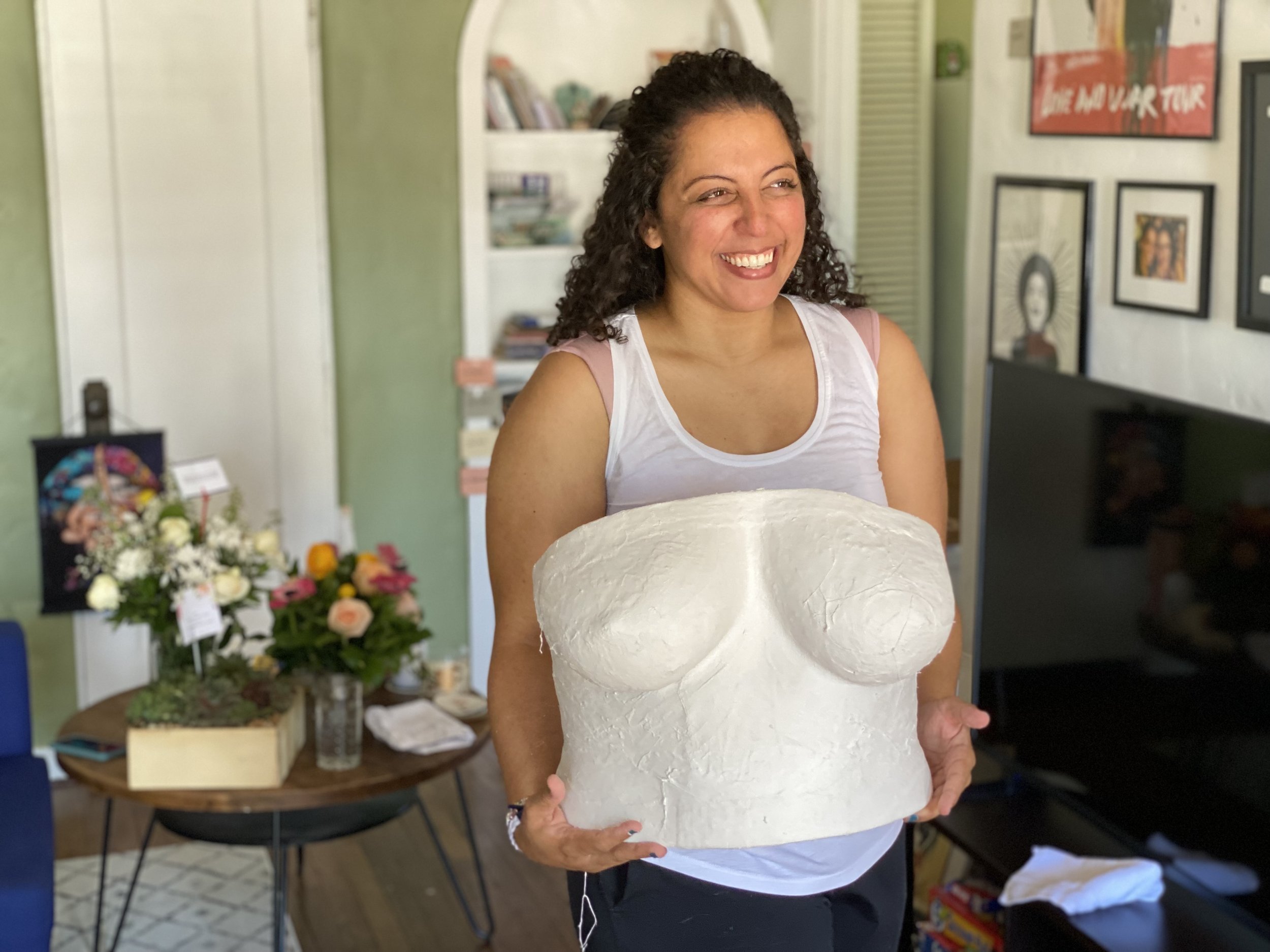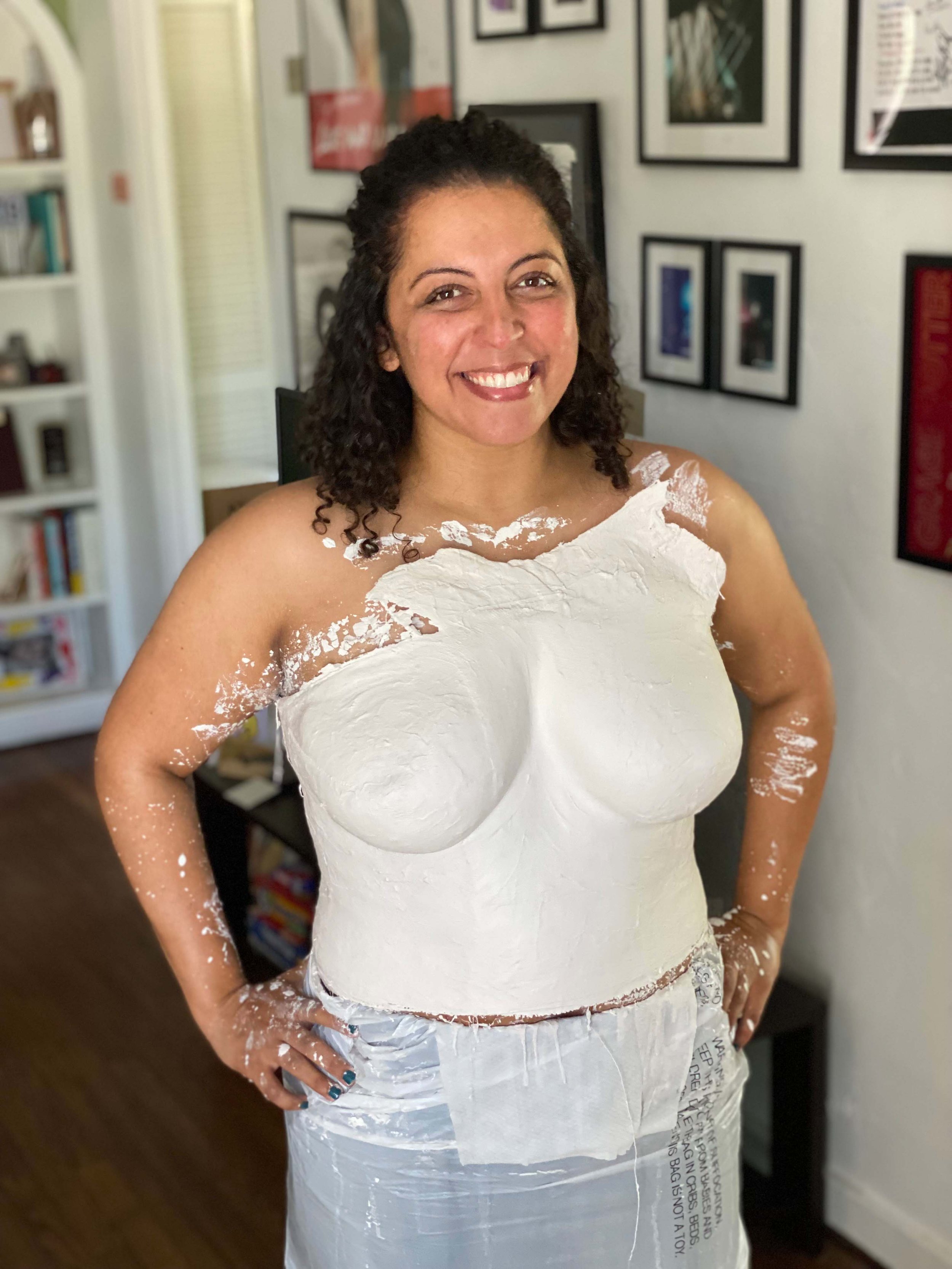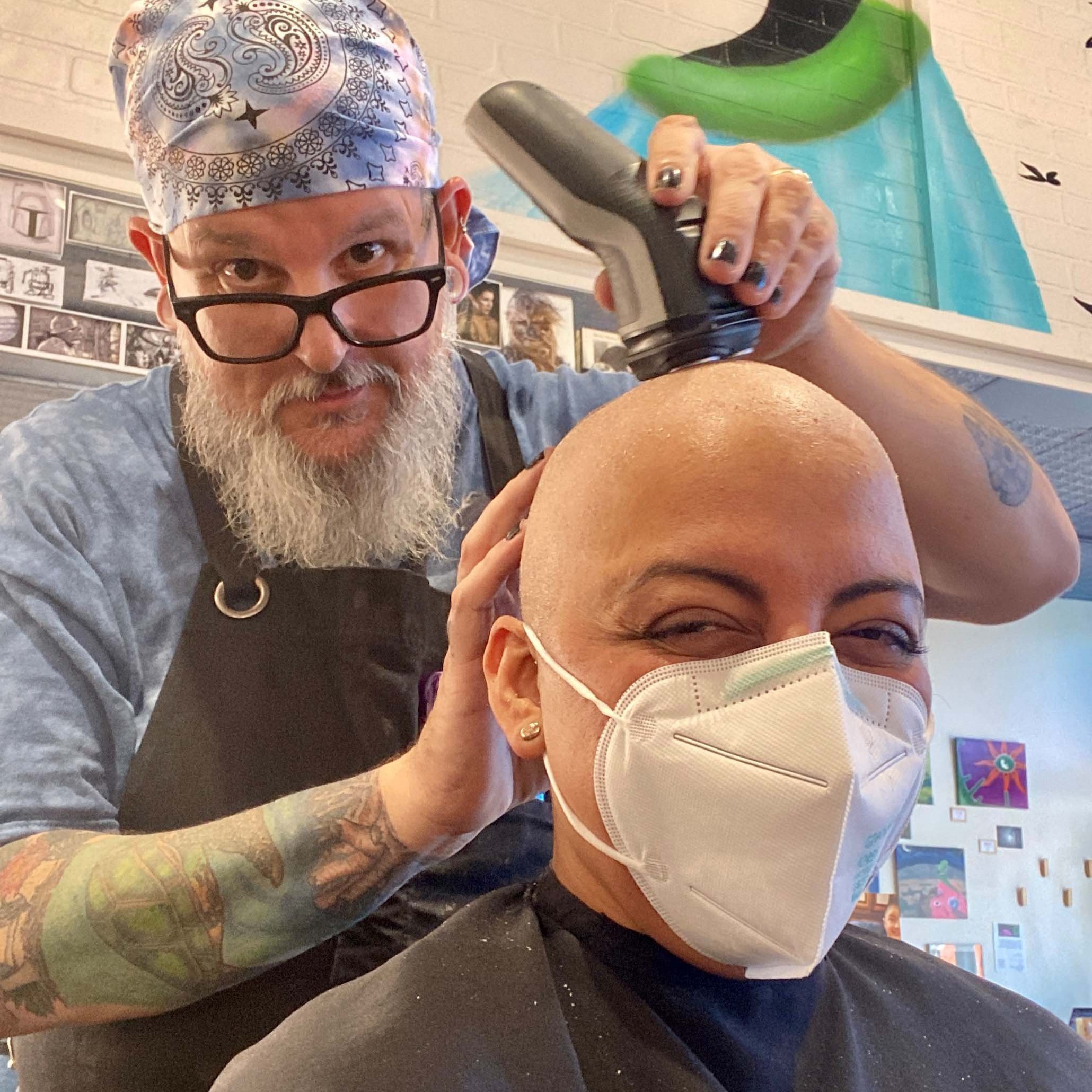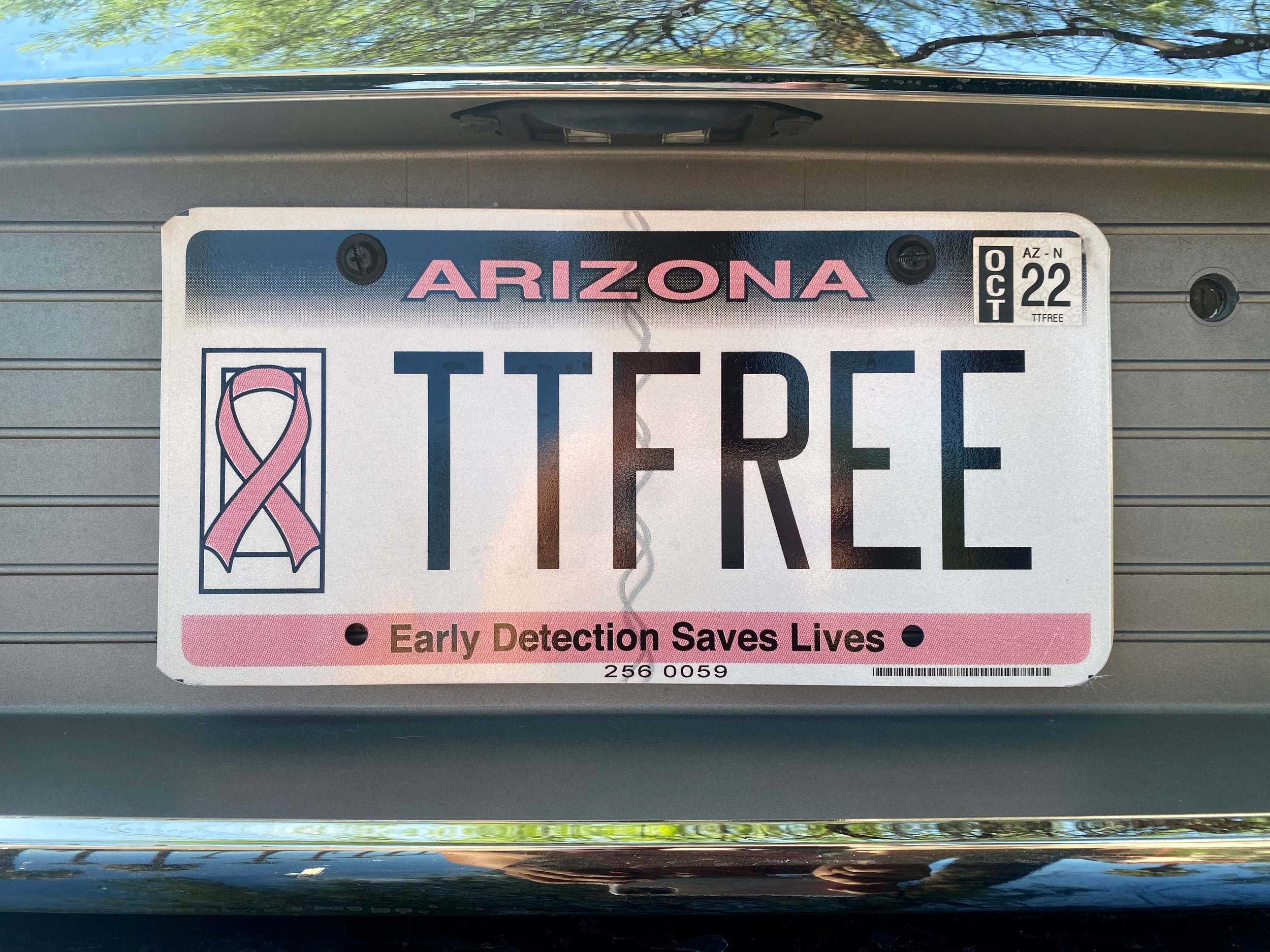Sarah Gennett’s Aesthetic Flat Closure Experience
SARAH GENNETT SHARES HOW PREPARATION AND THE RIGHT KIND OF SUPPORT AIDED HER ROAD TO RECOVERY
Sarah Gennett recently underwent surgery this June, as we kicked off our “Go Flat Month” campaign on social media and online, centered around advocating for awareness for the decision to choose “aesthetic flat closure” rather than reconstruction or further surgeries. We wanted to support her during this life-changing time, and our founder was able to drive out to cast Sarah the day before her surgery with one of our Treasured Chest Program kits. Below is a reflection from Sarah on her breast cancer experience and decision to go flat.
photo @laurenthepotter
1.) When were you diagnosed?
I was diagnosed on May 2, 2022. It's been the longest 6 months of my life. Unfortunately, I went undiagnosed at first by a terrible doctor. I was dismissed on several fronts and not provided accurate information about my results. The worst part was being made to feel stupid or like I was annoying for trying to ask questions. I think it was because I’m only 35.
I didn’t feel right so I decided to see a new doctor right away. After many tests, and surgery, my diagnosis is Invasive Ductal Carcinoma (IDC) of the right breast. 2.5 cm. Stage IIa, Grade 3, 0/3 nodes, ER+/PR-, HER2-.
Moral of the story: ALWAYS ADVOCATE FOR YOURSELF!
photo @laurenthepotter
2.) What led you to make the choice of going flat?
When I received my diagnosis, everything started to happen very quickly. My surgeon and I discussed my surgery details and she mentioned "with or without breast reconstruction" which got me thinking. I did a ton of research and found websites for organizations that promoted "going flat".
I read through several blogs similarly titled "Things I Wish I Knew Before My Reconstruction Surgery". I combed through lists of reasons for why reconstruction may or may not be for me.
Ultimately, I wanted the least amount of surgeries and less risk of infections, I wanted to recover faster, and most importantly, I was mentally comfortable with the idea of a flat chest.
I decided to have a double mastectomy to be proactive and because I wanted to be even across my chest. There were definitely some emotional days. I would try to find the silver linings and joke about the idea of some day not needing to wear a sports bra when going for a run. Overall, I felt my choice was what was best for my body and health.
3.) Were your doctors supportive of that decision?
Absolutely. Both my surgeon and oncologist encouraged me to consider a double mastectomy. I wouldn’t have been able to have reconstruction right away anyway because it was pretty certain I’d need either chemo or radiation and they didn’t want any complications. They were supportive of my choice to remain flat even after that though.
I should mention, if I had wanted to have reconstruction, I would have needed to meet with plastic surgeons and that would have taken more time than what I was afforded. My priority was to get the tumor out. Also importantly, my partner and my family were very supportive of this decision as well. Since my surgery my scars have healed pretty well, but even so, my surgeon has reassured me that touch ups to the scars are also possible if I’d like them to be aesthetically more even or straight. I found a lot of comfort in this
4.) How did you find Keep A Breast and what was it like being casted by me (Shaney Jo, our founder), what did that mean to you?
I'd heard some women do something special as a send off. A boobie party, boudoir photo shoot, etc. I saw a kit for making a cast and decided that's what I wanted to do.
I had a few ideas in mind and in my search for casts I came across the Treasured Chest Program by Keep A Breast. I was ecstatic and made a donation immediately. It was everything I knew I wanted to make this whole process a little brighter.
What totally took me by surprise though was the amazing level of friendliness and intuition by Mara (KAB’s amazing operations manager). Mara introducing us all and you reaching out about casting me yourself was definitely a highlight in all of this.
To welcome you into my home and share that space with you, my partner, and my best friend was everything. I felt nurtured and loved. It was comedic yet sentimental, sharing both champagne and a few tears. I needed it more than I knew. I'm just so grateful. That day will stay with me always.
5.) How has your healing process been?
I'd like to think everything I did to prepare for my surgery has helped to make for a smoother recovery. It was important to me that I reserve my time and energy for me, my appointments, research, and being with my friends and family.
I wasn't ready, and quite frankly just didn't want to talk about my diagnosis or cancer. I even actually created a spreadsheet so that I wouldn't have to communicate updates with everyone. Anyone could click the link and check in when they wanted. It seemed a little detached and insensitive, but it was becoming exhausting having the same conversations over and over again, so it's what I needed to stay positive and focused.
My first JP Drain was removed after 2 weeks. The second was removed at 3 weeks. I still had a lot of nerve pain and tenderness though so remained on meds. It took me about 5 weeks to recover overall from my surgery. My pathology report also came back quickly after my surgery. They got it all and it didn't spread, so I was truly happy and relieved.
However, my Oncotype DX Test score came back at 60 which is pretty high meaning my cancer is extremely aggressive. I’m actually now being treated as a triple negative cancer. So months later, I still keep my spreadsheet updated as I’m now in Chemotherapy treatments, for 5 months, and going through this whole rollercoaster.
I'm mentally, physically, and emotionally exhausted in pretty much every way so it really helps me stay organized. But I'm honestly ok though overall. I made time and space for myself to process this mess and I can talk about it more now.
Thankfully, I also have the most wonderful partner who took care of me as well as a loving family that could also help support me. I’ve also been off work on disability leave for 2 months which has helped immensely. I don't take any of this for granted.
6.) What would you say to anyone considering going flat?
I would ask yourself what you want, what you need, and what you deserve. If it is important to your mental health that the physical shape of your body resembles what it was pre-op, then be good and listen to yourself.
However, If you are concerned with the number of surgeries it will take to reach that body shape again, if you are comfortable with the idea of a flat chest, and/or just want more time to decide, go flat.
Flat is beautiful, and you can be perfectly confident, feminine, bold, and happy as a woman with a flat chest. Out of everything that has happened in the last 6 months, choosing to go flat has sincerely been the least of my worries.
Connect with women who've gone flat as well. Ask questions. All the questions about day to day life. For instance, I have been pleasantly surprised that there are not nearly as many people staring at me like I thought there would be. Actually, I don’t think I’ve even caught one person.
Most importantly, if you choose to go flat, make sure your surgeon knows you want an "aesthetic flat closure" as defined by the National Cancer Institute so they understand you want a smooth, comfortable flat chest with no extra skin left behind. My surgeon knew how important this was to me.
Share photos and document what you discuss. Ask about what your scar patterns will look like. If at any point your surgeon pushes back, seems more focused on reconstruction, or doesn't specialize in flat closures, don't fight it. Find another breast surgeon.
READ MORE:







